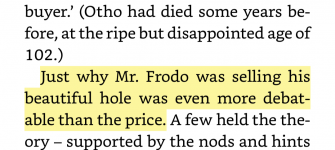Murphy
cat malogen
it was the last book I read as a nipper pre-puberty which created such a potent sense of malevolence, a malevolence with real agency
it offered a world beneath your feet too, so much unseen compared to the mine nearby at Ollerton/Helm’s Deep, from the corrupted intentions of adults to the realities of political power reflecting back the entire world - eg The Troubles - through a framework you could get your head around

(RS is looking a bit fatigued here)
it offered a world beneath your feet too, so much unseen compared to the mine nearby at Ollerton/Helm’s Deep, from the corrupted intentions of adults to the realities of political power reflecting back the entire world - eg The Troubles - through a framework you could get your head around
Nah.
Leastways I don't find her attractive in the films. I find her annoying. I'd like to dunk her head in the Anduin.

(RS is looking a bit fatigued here)



